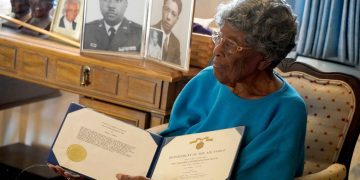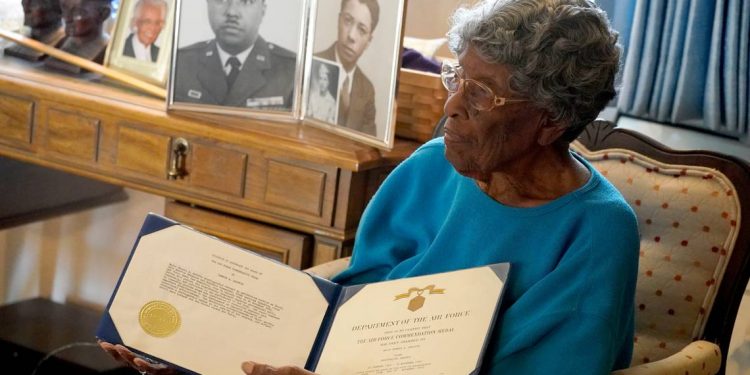By Hannatu Sadiq
The US Senate has passed legislation that would award members of the 6888 battalion, including Maj. Fannie Griffin McClendon, a black female soldier who fought in the World War II, with the Congressional Gold Medal.
The 6888 battalion popularly known as ‘Six Triple Eight’ were the only Black battalion of women to serve in Europe during World War II, serving as a role model to generations of Black women who joined the military.
The 6888th Central Directory Postal Battalion was credited with solving a growing mail crisis during its stint in England and upon their return, the exploits of the 855 members never got wider recognition — until now.
Although the bill is awaiting action in the House, it seems already too late for most 6888 members. There are believed to be only seven surviving, including Maj. Fannie Griffin McClendon.
McClendon joined the Air Force after the military was integrated and retired in 1971. She was the first female to command an all-male squadron with the Strategic Air Command. Another unit member, the late Doris Moore, became the first Black social worker in New Hampshire, her family said.
“Well, it would be nice but it never occurred to me that we would even qualify for it,” McClendon said from her home in Arizona.
“I just wish there were more people to, if it comes through, there were more people to celebrate it,” said McClendon, who has met with her local congressman to press for passage of the bill.
The 6888 was sent overseas in 1945, a time when there was growing pressure from African-American organizations to include Black women in what was called the Women’s Army Corps and allow them to join their white counterparts overseas.
Having dodged German U-boats on their way to England and scrambled to escape a German rocket, the unit were deployed to unheated, rat-infested airplane hangars in Birmingham, England.
They were assigned a daunting mission to process the millions of pieces of undelivered mail for troops, government workers and Red Cross workers. The mountains of mail had piled up and troops were grumbling about lost letters and delayed care packages. Thus their motto, “No Mail, Low Morale.”
The 6888 toiled around the clock, processing about 65,000 pieces of mail in each of the three shifts. They created a system using locator cards with a service member’s name and unit number to ensure mail was delivered. Sometimes, they had to resort to detective work when a parcel only had a common name or a service member’s nickname.
“They kept hollering about wanting us to go overseas so I guess they found something for us to do overseas: Take care of the mail,” McClendon said. “And there was an awful lot of mail. … They expected we were gonna be there about two or three months trying to get it straightened out. Well I think in about a month, in a month and a half, we had it all straightened out and going in the right direction.”
The unit endured questions and criticism from those who didn’t support Black women in the military despite these achievements.
They cleared out a backlog of about 17 million pieces of mail in three months — twice as fast as projected. The battalion would go on to serve in France before returning home. And like so many Black units during World War II, their exploits never got the attention afforded their white counterparts.
“It is sad to say. They came back to Jim Crow America,” Cummings said. “Not only 6888 but a lot of our minority soldiers who returned from the war were not recognized or appreciated until years later. The Tuskegee Airmen, Montford Point Marines. There are so many stories of units of color who were not recognized until decades after the war.”
“These women were trailblazers, and it is past time that we officially recognize them for their incredible contribution to our troops during World War II,” said U.S. Sen. Maggie Hassan, a New Hampshire Democrat who co-sponsored the Senate bill.




































